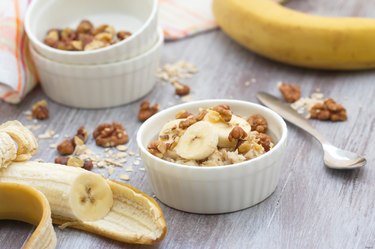
Your alarm buzzes. Your adrenaline kicks in. It must be race morning. Whether you're lining up for a 5K, 10K, or a half or full marathon, you have one last chance to fuel up for the effort to come.
If there's one rule for a race-morning breakfast, it's this: Don't eat anything you haven't tried before. The earlier in your training you begin practicing your morning meal, the more chances you have to figure out what works for your digestive system, says registered dietitian nutritionist Lydia Nader, founder of RUN Performance Nutrition in Chicago.
Video of the Day
Video of the Day
Race day nerves might make it more difficult than usual to eat, Nader points out that having a go-to pre-run fueling strategy means that you can feel that much more confident in your routine. While the optimal race-morning meal differs widely by athlete, here are a few general guidelines for starting the day off right.
Focus on Carbs
Carbohydrates are your body's preferred source of energy during exercise, says Tom Holland, a runner, triathlete, sports nutritionist and author of Swim, Bike, Run, Eat. For most runners, keeping your pre-race meal low in fat, protein and fiber speeds digestion and decreases the risk of gut troubles during the event.
While your daily diet should focus more on complex carbohydrates — whole grains and other foods rich in fiber, vitamins and minerals — your race-morning breakfast can tilt a bit more toward simple carbs, Nader says. These are foods like white bagels, pancakes and fruit juices that digest quickly to provide you with fast energy.
The same types of sports-focused products often used as fuel during a race—like bars, gels and drinks—can work beforehand. Holland, for instance, often relies on a custom-blended drink mix in the final hours leading up to a big endurance event.
Tailor the Amount to the Distance
For races that last longer than an hour, March 2016 research published in the Journal of the Academy of Nutrition and Dietetics recommends consuming one to four grams of carbs per 2.2 pounds of body weight, one to four hours before exercise. That's between 68 and 272 grams of carbs for a 150-pound person. For reference, a cup of oatmeal contains about 27 grams of carbs. Shorter distances — such as a 5K — won't demand as much energy.
Granted, this is simply what the research shows, and the amount you eat is something else to practice during your training. Experiment with different foods, and see how you feel. If you take in 200 calories of mostly carbs before a 20-mile long run, then feel famished and exhausted toward the end, try eating more next time, Holland says. On the flip side, if you felt heavy after a full breakfast before a shorter run, you might want to eat less — or earlier — on the morning of your next 5K.
What’s in Your Cup?
You'll want to start the race properly hydrated — which means your urine will be a light yellow or almost clear color, Nader says.
In addition to drinking adequate water, sipping a sports drink the morning of the race can offer you an added dose of carbohydrates and electrolytes, important minerals that ensure proper fluid balance. Aim to stop drinking a half-hour or so before the race, so you have enough time to hit the Porta Potty for a final time before things kick off.
Read more: Dehydration and Water Vs. Gatorade
For coffee drinkers, your morning cup of Joe could give your performance an extra boost. December 2008 research published in Applied Physiology, Nutrition and Metabolism shows that doses of about three milligrams per 2.2 pounds of body weight may boost performance in endurance events. Coffee can also activate your intestines and jump-start digestion process, something to keep in mind as race time draws near.
One thing to note: its effects depend, in part, on how regularly you use it. Since many sports drinks and gels contain caffeine as well, it's easy to lose track of your consumption. The Mayo Clinic recommends 400 milligrams per day or less (a typical cup of brewed coffee contains between 95 and 165 milligrams). Make sure to watch for warning signs you've had too much, including rapid heartbeat and muscle tremors.
Sample Pre-Race Meals to Try
Looking for ideas to tinker with in training? Here are a few great pre-run options to get you started.
- A half-cup oatmeal made with 1 cup dairy milk, plant milk, or coconut water, with a half-cup of fruit and a sprinkle of cinnamon
- Six to eight ounces Greek yogurt with 1/2 cup berries or other fruit (Note: Some runners don't do well with dairy on race day)
- A granola bar or sports bar
- A half-cup to one cup cereal (check labels for serving sizes) with a half-cup berries and 1 cup dairy or plant milk
- One large bagel with two slices tomato and 1 ounce low-fat cheese
- Peanut butter and banana or peanut butter and jelly sandwich, made two slices of bread and one to two tablespoons each nut butter and jam (or one banana)
- One whole apple with two tablespoons peanut or almond butter
- International Journal of Sports Nutrition and Exercise Metabolism: "Dietary Tendencies as Predictors of Marathon Time in Novice Marathoners"
- International Journal of Sports Nutrition and Exercise Metabolism: "A Low Glycemic Index Meal Before Exercise Improves Endurance Running Capacity in Men"
- Journal of the Academy of Nutrition and Dietetics: "Position of the Academy of Nutrition and Dietetics, Dietitians of Canada, and the American College of Sports Medicine: Nutrition and Athletic Performance"
- Applied Physiology, Nutrition and Metabolism: "Caffeine and sports performance"
- Mayo Clinic: "Caffeine content for coffee, tea, soda and more"
Was this article helpful?
150 Characters Max
0/150
Thank you for sharing!
Thank you for your feedback!